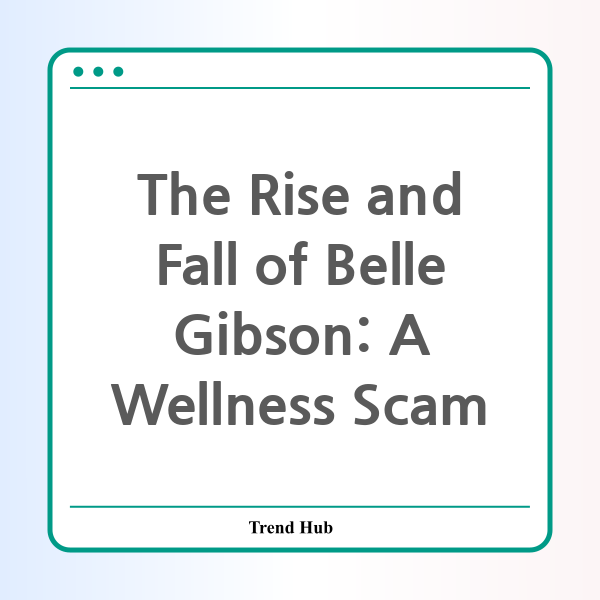* This website participates in the Amazon Affiliate Program and earns from qualifying purchases.

In the modern digital age, where personal stories can go viral, the line between truth and deception has blurred significantly. One of the most shocking tales to emerge in recent years is that of Belle Gibson, an Australian wellness blogger whose fabricated claims about a terminal illness captivated many, only to reveal itself as a dangerous scam. How did Belle build an empire based on lies, and what can we learn from her story?
Belle Gibson’s journey began with her purported diagnosis of a terminal brain tumor. She mesmerized followers by claiming that a strict, clean-eating diet had allowed her to lead a normal life despite her illness. This narrative, which she crafted carefully, resonated deeply with many, particularly cancer patients seeking hope and alternatives to traditional medicine.
What made Gibson's story particularly compelling was the persona she created. Drawing inspiration from her personal struggles, she fashioned herself into an influencer, launching her app "Whole Pantry" and achieving celebrity status within the wellness community. However, as investigative scrutiny increased, her empire began to crumble. Numerous reports asserted that she never had the cancer she claimed to have, leading to devastating consequences for her followers.
But Gibson’s misdeeds went beyond merely misleading her audience about her health. She raised significant amounts of money, promising donations to various charities, yet failed to deliver on her commitments. In one heartbreaking instance, Gibson connected with a mother of a severely ill child, claiming she would help raise funds for treatment. Instead of delivering on these promises, she continued her charade, all while ignoring the genuine distress of those who put their trust in her.
As the truth began to unravel, journalists and concerned individuals started to piece together Gibson’s history. Investigations revealed that many of her wellness claims were unfounded and that her extensive background was shrouded in exaggeration and deceit. Her personal relationships also bore the brunt of her lies. A close examination of her backstory indicated that the family dynamics she described were inflated tales crafted to elicit sympathy.
In a world that celebrates social media influencers often without question, the saga of Belle Gibson serves as a cautionary tale. It emphasizes the importance of critical thinking when engaging with health and wellness content online. The prevalence of unregulated information on social media can lead audiences to place undue trust in individuals without any medical qualifications simply because they present themselves well.
Moreover, Gibson’s exposure highlights the vulnerabilities of those seeking hope in dire situations. Cancer patients and others with serious health conditions often grapple with significant emotional stress, making them susceptible to persuasive claims about alternative treatments. This story encourages a dialogue about the ethical responsibilities of influencers and the critical importance of accountability in the wellness industry.
Ultimately, the narrative of Belle Gibson is not just about a con artist who exploited social media for personal gain; it is also about the critical need for transparency and truth in an age where misinformation is rampant. As the wellness industry continues to grow, it becomes essential for consumers to advocate for truth and integrity, ensuring that stories of hope do not devolve into tools of deception.
As we reflect on this tale, let us strive to be vigilant and discerning, to champion genuine healing practices backed by science, and to always question narratives that seem too good to be true.
* This website participates in the Amazon Affiliate Program and earns from qualifying purchases.